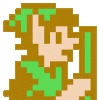This is the time period I am most familiar with, and thus feel competent to speak about at-length.
I of course realize game development predates, these dates; but in many ways it was an identical ebb and flow of AAA and small startups.










@Servant of the Lord
Thanks for your commentary on it; I intentionally left out pre-mid-90's history; as I'm not exceptionally well versed on commenting on it.
What I have researched about it, is that indie development was mostly regional and then of course folded into bigger business for distrubution on consoles, and bigger retailers.
I think you said it best in point B; in the time you're talking about there was no major indie distinction.
Though I disagree with you concerning nobody welcoming indies, at least in the 2000' era; I have experience with this being the case.
I also make a distinction here between, AAA companies, private small-businesses with full time employees engaged in the business of developing games, and 'indies' or 'indipendent game developers' which are often singular or multi-group partnerships, often without a centralized office.



You need more dates on the graphic to give a better indication of changes over time. Also, you have no mention of Flash games and their impact. Since there were a great deal of them and they were generally provided to consumers free of charge, I would say they likely had a significant impact on current price expectations.
I think perhaps you're a bit too hung up on a specific label. Perhaps it'd be appropriate to think of 'ye olde indies of yore' as the modern day hobbyist. A hobbyist would have the artistic freedom to produce the sorts of games that you seem to be pining for. And in the end there's nothing stopping a hobbyist from selling a finished product. They just aren't planning to make a living off of it in the way that an indie might be.
I think you have a whole 'rose by another name' situation going on here. What you're looking for isn't gone, it's just got a different name.

lol Blanc, i agree! no need for another thread EDI! we got your point with the first! But the cartoons were funny! :P

I remember back to the mid-80s. Consoles, arcades, and commercial PC games were big. There were shareware compilation floppies and a lesser extent BBS/internet file sharing - you might call that 'early indie' or just 'hobbyist'. But that's like prehistory - there were only a few big game companies (eg. Atari, Nintendo) until well into the 90s.
Many problems stem from internet globalization... more people fighting over one pie, where there used to be plenty of local/regional pies. It's a double whammy - this, and Unity games etc.
You forgot the fact that games, requiring less content, could be slapped together in 5 months or less, and the industry (including indies) so flooded the market with cheap trash that the entire industry crashed twice (in 1977 and 1983).
There is alot more to the history of videogames, and that info-graphic glosses over important details, so it's not really 'thought provoking', and (in my opinion, and bearing in mind that I wasn't born back then) is actually inaccurate.
For example, between the first two chunks of that infographic, there's a fifteen year gap, and the first chunk has two inaccurate details:
A) "Brick and mortar sales dominate, in tight lock with commercial publishers.".
This was the era when stores even sold games in ziplock bags.
B) "The indie market is wide open and willing to uptake hard-crafted gems from these indie developers" / "Review magazines and sites welcome indies and publicity is easy to get"
First, there were hardly any "sites" at the time, pre-internet days.
Second, when games looked like this, there was zero distinction between "studios" (of maybe 50 people - 5 people on a project - they weren't huge), and "indies" (who weren't called indies). So there was no "indie market" and "AAA market", there was just the "videogame market" where everyone was on equal ground.
Nobody "welcomed indies", they welcomed developers in general - because there was no distinction between "indie" or "professional". Infact, the term "indie" just meant ANY studio (of one or more people) who wasn't funded by a publisher (even if their game was distributed by a publisher). Like Valve software and Stardock and Introversion software.